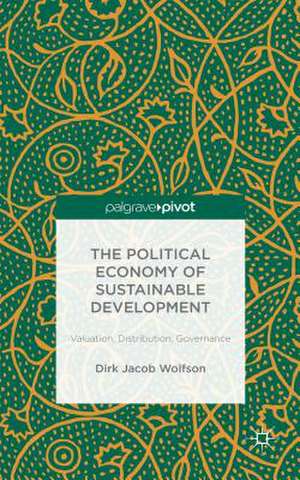The Political Economy of Sustainable Development: Valuation, Distribution, Governance
Autor Dirk Jacob Wolfsonen Limba Engleză Hardback – 11 iun 2015
Preț: 375.42 lei
Nou
Puncte Express: 563
Preț estimativ în valută:
71.88€ • 74.85$ • 59.64£
71.88€ • 74.85$ • 59.64£
Carte tipărită la comandă
Livrare economică 13-27 februarie
Preluare comenzi: 021 569.72.76
Specificații
ISBN-13: 9781137552747
ISBN-10: 1137552743
Pagini: 82
Ilustrații: IX, 82 p.
Dimensiuni: 140 x 216 x 10 mm
Greutate: 0.27 kg
Ediția:1st ed. 2015
Editura: Palgrave Macmillan UK
Colecția Palgrave Pivot
Locul publicării:London, United Kingdom
ISBN-10: 1137552743
Pagini: 82
Ilustrații: IX, 82 p.
Dimensiuni: 140 x 216 x 10 mm
Greutate: 0.27 kg
Ediția:1st ed. 2015
Editura: Palgrave Macmillan UK
Colecția Palgrave Pivot
Locul publicării:London, United Kingdom
Cuprins
1. Introduction
1.1. About this book
1.2. Economic analysis and environmental policy: scope and limits
1.3. Cost-benefit analysis: a preview
1.4. Valuation, distribution and legitimacy
1.5. Short cuts: cost-effectiveness, standards, multi-criteria and workable competition
1.6. Global economic development and ecological constraints
2. Valuation
2.1. The ' 'Coase-solution ' ' and emissions trading
2.2. Hedonic pricing, travel cost method and averting behaviour
2.3. Stated preferences: contingent valuation and choice experiments
2.4. Co- valuation and externalities in production functions
2.5. Persuasion
2.6. Fiscal instruments for managing preference
2.7. Innovation as externality on the supply side
2.8. Shadow prices or regulation?
2.9. Combining results, and sensitivity analysis
3. Distribution
3.1. Optimal allocation and fairness in distribution
3.2. Fiscal solutions
3.3. Distributional weights
3.4. Visions of justice
4. Governance
4.1. Cost-benefit analysis revisited
4.2. Interactive governance and information management
4.3. Situational contracting: implementation and empirical evidence
4.4. Situational solutions in the valuation and distribution of environmental policy
4.5. Summary and conclusions
1.1. About this book
1.2. Economic analysis and environmental policy: scope and limits
1.3. Cost-benefit analysis: a preview
1.4. Valuation, distribution and legitimacy
1.5. Short cuts: cost-effectiveness, standards, multi-criteria and workable competition
1.6. Global economic development and ecological constraints
2. Valuation
2.1. The ' 'Coase-solution ' ' and emissions trading
2.2. Hedonic pricing, travel cost method and averting behaviour
2.3. Stated preferences: contingent valuation and choice experiments
2.4. Co- valuation and externalities in production functions
2.5. Persuasion
2.6. Fiscal instruments for managing preference
2.7. Innovation as externality on the supply side
2.8. Shadow prices or regulation?
2.9. Combining results, and sensitivity analysis
3. Distribution
3.1. Optimal allocation and fairness in distribution
3.2. Fiscal solutions
3.3. Distributional weights
3.4. Visions of justice
4. Governance
4.1. Cost-benefit analysis revisited
4.2. Interactive governance and information management
4.3. Situational contracting: implementation and empirical evidence
4.4. Situational solutions in the valuation and distribution of environmental policy
4.5. Summary and conclusions
Recenzii
'A very well-thought-out, interesting and novel examination of the subject.' Eugene Nulman, University of Kent, UK
'This interdisciplinary and non-technical introduction nests economic efficiency, fairness and ecological principles in a political economy framework. 'Situational contracts' meld these principles to yield understanding of how democratic societies seek a sustainable future. Such contracts reflect both political constraints and proxy information on citizen preferences; they lead to policy outcomes which mesh concerns with efficiency, justice, and "planners' preferences". This book provides unique and valuable insights into the complex process in which environmental policy is formed.' - Robert Haveman, University of Wisconsin-Madison, USA
'This interdisciplinary and non-technical introduction nests economic efficiency, fairness and ecological principles in a political economy framework. 'Situational contracts' meld these principles to yield understanding of how democratic societies seek a sustainable future. Such contracts reflect both political constraints and proxy information on citizen preferences; they lead to policy outcomes which mesh concerns with efficiency, justice, and "planners' preferences". This book provides unique and valuable insights into the complex process in which environmental policy is formed.' - Robert Haveman, University of Wisconsin-Madison, USA
Notă biografică
Dirk Wolfson served with the IMF and Dutch Treasury, and was Professor of Economics at Erasmus University Rotterdam, The Netherlands, before his election in the Senate. Upon retirement, he returned to academia. He is a member of the Dutch Royal Academy of Arts and Sciences and publishes widely on economics, the environment and political philosophy.
















